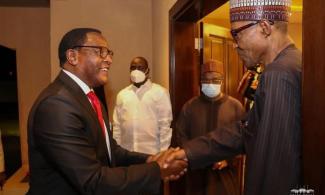
Ngige had said the government took borrowed funds from foreign institutions like the World Bank to offset some recurrent expenditures.
Malawian President, Lazarus Chakwera has cancelled two international meetings in June, saving K268 million (N109 million at official rates) in line with the expenditure control measures he announced on 31st May 2022.
According to Malawi24, the Minister of Foreign Affairs, Nancy Tembo disclosed this while addressing journalists on Sunday.

The meetings Chakwera has decided to skip are OPEC Fund Development Forum in Vienna, Austria and the Commonwealth Heads of Government Meeting, also known as CHOGM 2022, in Kigali, Rwanda.
Both meetings are taking place in June.
Meanwhile, his Minister for Energy, Ibrahim Matola and Minister of Water and Sanitation, Abida Mia will represent him at the OPEC meeting and the host of the meeting will fund the trip.
Minister of Foreign Affairs Nancy Tembo will also represent the President at CHOGM meeting.
Speaking also, Finance Minister, Sosten Gwengwe said K268 million will be saved as a result of Chakwera’s decision not to attend the OPEC Fund Development Forum and Commonwealth Heads of Government meetings respectively.
Gwengwe said fiscal consolidation is key to making sure expenditure is tightly controlled.
According to Gwengwe, the government has not banned foreign trips but public officers are restricted to only essential trips.
However, despite being broke, his Nigerian counterpart, Muhammadu Buhari has been junketing across the world in the last three months even though Nigeria is broke.
On June 1, 2022, the Nigerian President left for Madrid, Spain, on a State Visit at the invitation of the Spanish President, Pedro Sanchez.
Then on May 26, he travelled to Malabo, Equatorial Guinea, to participate in the African Union Extra-ordinary Session of the Assembly of Heads of State and Government
Buhari also in May 2022 travelled to United Arab Emirates, UAE, on a condolence visit to the new President of the country, Sheikh Mohamed bin Zayed Al Nahyan.
The President on May 9 led an eight-man Nigerian delegation to Abidjan, Cote d’Ivoire, to attend a two-day United Nations organised conference on the future of land, regarding desertification, drought, degradation, rights, restoration and implications for national and world economies.
He was on March 1, 2022, in Kenya for the Special Session of the United Nations Environmental Programme (UNEP@50).
Two days after returning to Nigeria from Kenya, Buhari left the country for his routine medical trip to London, United Kingdom.
His ministers had at various times said Nigeria is broke and has been borrowing to fund its budgets and relying on loans to pay salaries.
For example, Minister of Labour and Employment, Mr Chris Ngige, while doctors were on strike over poor allowance, had in September 2021 confirmed that the Nigerian government under President Buhari borrowed funds from international sources to pay the salaries of workers because of a shortfall in the country’s revenue.
Ngige had said the government took borrowed funds from foreign institutions like the World Bank to offset some recurrent expenditures.
Also, the Minister of Finance, Budget and National Planning, Zainab Ahmed, had in April 2021 admitted that Nigeria’s economy was facing a difficult time, saying borrowing was inevitable.
She had said, “We have very low revenues, we have very high expenditures. What we have done so far is just to provide some stability to make sure salaries are paid, pensions are received every month; that we send funds to the judiciary and the legislature; that we meet our debt service obligations.
“That’s what we are doing. It also means we have had to borrow more than we had planned before the COVID-19 started because we need to still continue to invest in infrastructure using our national budget. We borrowed to invest in key projects such as roads, rail, airports, seaports and several other investments that are required in health and in education and upgrading the social standards and quality of life of our people and Nigeria is not unique as several countries of the world went into recession.
“Almost every other country has had to borrow more than it planned. It means we expanded our deficit very fast in 2020. 2021 is a year that we see as the year of recovery.
“So, FAAC reduces and whenever FAAC reduces, it is a very difficult situation and in the past one year, we have tried to fall back on some specific accounts that are meant to be saved; savings that when you have such a situation, you fall back on the resources and augment.
“So, we take funds based on Mr President’s approval either from Excess Crude or Stabilisation Account or in some cases, President approved for us to take funds from LNG (Liquefied Natural Gas) dividends. In the month of March, we had a shortfall of FAAC that was about N50 billion; we didn’t have enough accrued in any of those accounts other than some N8.5 billion that we took from the exchange rate differential account so we added that and we ended up with the FAAC of N605 billion.”
Nigeria’s dwindling finances have also come under intense pressure as the Buhari-led government has been amassing foreign loans.